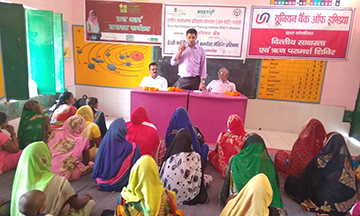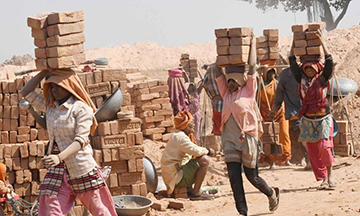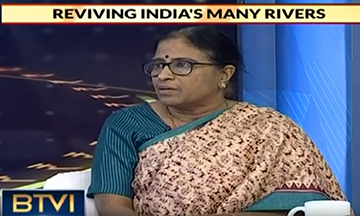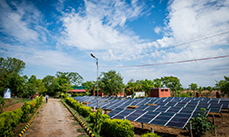UPCOMING
EVENTS
 Zeenat Niazi (VP, DA) as a panelist at WCEF 2019
Zeenat Niazi (VP, DA) as a panelist at WCEF 2019
Zeenat Niazi shared her view on the economic potential of the circular built environment at the World Circular Economy Forum 2019, in Helsinki, Finland. Read More... #circulareconomyGet in touch with: Zeenat Niazi
 DA at UN Bonn Climate Change Conference
DA at UN Bonn Climate Change Conference
Gitika Goswami (Senior Programme Director, Development Alternatives) shared her perspective on assessing impacts of adaptation finance at different scales at UN Bonn Climate Change Conference in Germany. Read More... #climatechangeGet in touch with: Gitika Goswam
 Launch of Work 4 Progress Technology Challenge
Launch of Work 4 Progress Technology Challenge
To make new economy entrepreneurship opportunities for young women in rural india, la Caixa Banking Foundation in association with DA launched "Technology Challenge". Read More... #work4progress
Get in touch with: Ankita Pant
 Work 4 Progress annual workshop
Work 4 Progress annual workshop
Kanika Verma (Lead, Work 4 Progress India, DA) shared evidence on the role of social innovation in transforming social realities and contributing to sustainable livelihoods, at annual workshop organised by "la Caixa" Banking Foundation. Read More... #work4progress
Get in touch with: Kanika Verma
 DA’s sustainable building products exhibited at UN-Habitat Assembly
DA’s sustainable building products exhibited at UN-Habitat Assembly
AProducts related to construction technology, rural housing and habitat capacity building were displayed at the UN-Habitat Assembly. Read More... #resourceefficiencyGet in touch with: Soumen Maity
 Cleanliness Drive at Sarnahuli Parashar Mela in HP
Cleanliness Drive at Sarnahuli Parashar Mela in HP
Cleanliness drive was organised at the Sarnahuli Parashar mela, in Himachal Pradesh by Development Alternatives. Young students performed a nukkad natak to raise awareness and sensitise people on cleanliness.
Read More... #WASHGet in touch with: Kavya Arora
 Screening of COCO model Film in Madhya Pradesh
Screening of COCO model Film in Madhya Pradesh
A screening of a short film on Community owned community Operated (COCO) drinking water model was organised in Mador Village in Madhya Pradesh on June 22, 2019. The COCO model is based on the principles of initiating community-led action. Read More... #sustainability
Get in touch with: Omkar Gupta
 Dairy Farming Training for TARA Akshar+ graduates by RSETI Bhadohi
Dairy Farming Training for TARA Akshar+ graduates by RSETI Bhadohi
TARA Akshar+ learners were trained in good dairy farming practices and how to better take care of their cattle. Read More... #literacyGet in touch with: Divya Mehrotra
 TARA Akshar+ graduates celebrated International Yoga Day
TARA Akshar+ graduates celebrated International Yoga Day
Cleanliness drive was organised at the Sarnahuli Parashar mela, in Himachal Pradesh by Development Alternatives. Young students performed a nukkad natak to raise awareness and sensitise people on cleanliness.
Read More... #literacyGet in touch with: Divya Mehrotra
PUBLICATIONS
 Work 4 Progress Information Booklet
Work 4 Progress Information Booklet
The Work 4 Progress (W4P) program of "la Caixa" Banking Foundation aims to accelerate the creation of meaningful and dignified employment in three developing countries through the creation of platforms for innovation, action and continuous learning. This bulletin brings to you a full range of emotions that the team has experienced - innovations that boosted us, discoveries that surprised us, and impact that inspired us.
 Compendium on Bridging the Digital Divide for Livelihood and Empowerment
Compendium on Bridging the Digital Divide for Livelihood and Empowerment
This document is an outcome of a project funded by Ford Foundation, titled “Bridging the Digital Divide, Incubating Technology Innovations and Content Development of Livelihood Options, Building Capacities of Community Based Organisations”. Bridging the Digital Divide for Livelihood and Empowerment The case story compendium is a compilation of stories from these five intervention districts. The compendium highlights the socio-economic upliftment of individuals who have been benefited during the course of the project.
The ‘WASH in schools' initiative has used the approach code called the 4 A's approach (Assessment, Awareness, Action and Advocacy). By supporting good health, hygiene and dignity at this formative stage in a child's life, the ‘WASH in schools' initiative has yielded multiple dividends such as reduction in the school drop-out rate especially of the girl children; promotion of gender equality by building sanitation structures separately for the girls; and sensitisation of the community to take action towards demanding safe water and toilet facilities.
DA IN NEWS
 How resource overuse has now put us on the brink of collapse in many sectors
How resource overuse has now put us on the brink of collapse in many sectors
India's development trajectory has to meet the twin objectives of 'Prosperity for All,' 'Within Planetary Boundaries'. National strategies for economic development and growth must, therefore, ensure that building financial and human capital does not stress our natural capital; rather, it must regenerate it. A national policy framework that guides the sustainable management of our natural resources and ecosystem services is critical to secure India's future.
 Red brick kilns in Bihar destroy about 6,000 acres of land every year
Red brick kilns in Bihar destroy about 6,000 acres of land every year
The study has been done by DA in association with Bihar State Pollution Control Board. Commenting on this situation, BSPCB chairman Ashok Kumar Ghosh said, “The red brick kilns are destroying the agricultural land and depleting the groundwater also
 Addressing India's water crisis-Adiscussion on Business Television India
Addressing India's water crisis-Adiscussion on Business Television India
While the government has created a new ministry to look at water conservation, the President, Prime Minister and the entire cabinet is talking about the issue. With India's ground water depleting, is it too late to address issues of irrigation and drought? To discuss this Business Television India (BTVI) organised a panel discussion on Addressing India's Water Crisis. Dr K. Vijaya Laksmi, VP Development Alternatives emphasised on the mismanagement of water as the prime reason for crisis.
PERSPECTIVES

Resource Efficiency for Sustainable Wellbeing of All
For centuries, our development and economic prosperity has depended on production of more and more goods and services. This has led to an ever-growing consumption of natural resources, which in turn has required an ever-increasing extraction and depletion of these resources from Mother Earth. The emerging results are severe threats to nature’s capacity to yield (let alone regenerate) the resources we need such as water, metals, minerals, fossil fuels, fish stock, arable soils, wildlife and the diminution of our forests, soils and rivers. The extraction, transportation, processing and use of resources is highly energy-consuming and this activity is a very large contributor to carbon emissions and climate change. Furthermore, rapidly expanding extraction and use of resources is the single greatest cause of biodiversity loss and desertification, not to mention the clouds of toxic pollution and mountains of non-processable waste that we are producing.
VIDEO

With effects of climate change bearing down on the fragile region of Bundelkhand in Central India, farmers have to face a host of challenges.This film showcases Development Alternatives’ efforts in promoting sustainable agricultural techniques which are helping farmers adapt to the changing climate and increase their income levels.
B-32, Tara Crescent, Qutub Institutional Area, New Delhi 110 016, India
Tel:91 (11) 2654-4100, 2656-4444, Fax. 91 (11) 2685-1158
www.devalt.org







